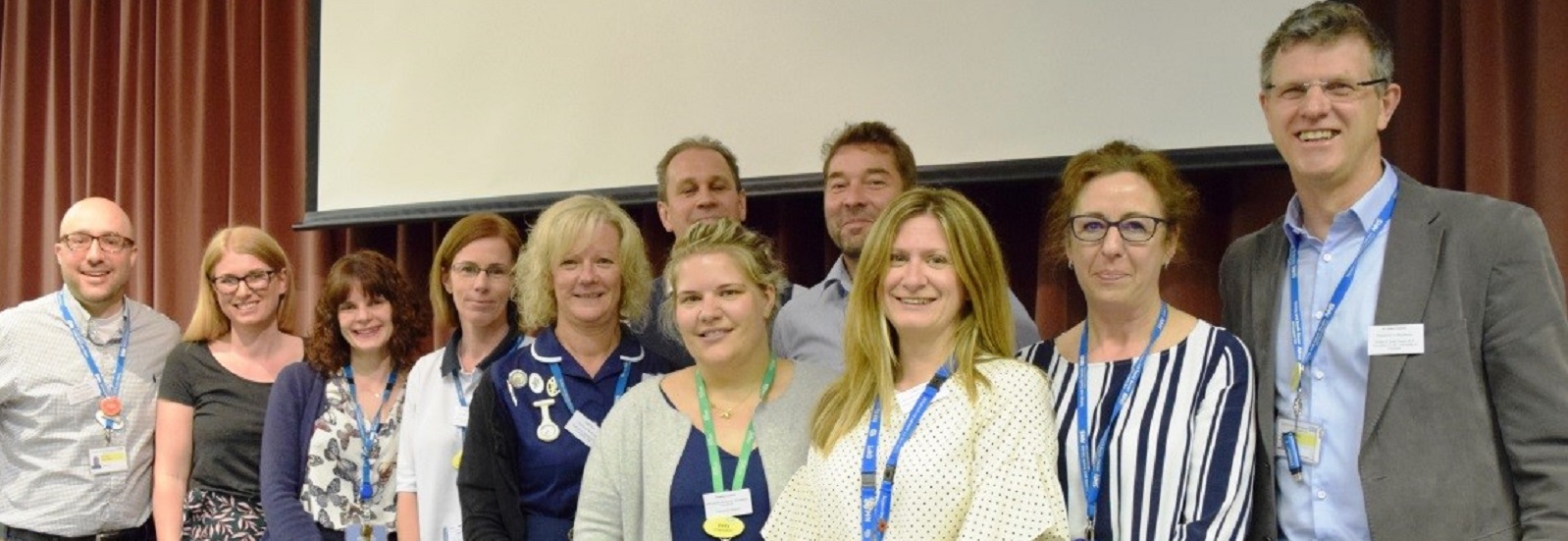Introduction
An ageing population, with many people living with multiple complex health and social care issues, and austerity is putting increasing pressure on the NHS and social care services. As a response, national policy is promoting different models of service redesign to improve quality and experience of care and reduce demand.
Torbay and South Devon Foundation Trust (TSDFT) hosted two (part-time) Researchers-in-Residences (RiRs) to help support the evaluation of two specific service innovations:
1. The enhanced intermediate care service (EIC) looking to avoid hospital admission or bridging journeys back to people’s homes
2. Rolling out multi-disciplinary health and wellbeing teams including wellbeing coordinators (employed by the voluntary sector), ideally preventing people from becoming unwell in the first place.
The Researcher-in-Residence role is a relatively new approach to co-producing evaluation and research in the NHS and to facilitate service implementation. The model embeds researchers into the organisation, and aims to facilitate the translation of evidence into practice (where available) or develop the evidence base where this is weak or highly contextualised, and/or needs adapting to local context. The approach is action-orientated and participatory, seeking to impact the development and implementation of service innovations in real time by working alongside front line teams and managers.
Project aims
Research question:
How do the multiple service innovations within one locality of Torbay and South Devon contribute to creating a coherent and person-centred system for people with long-term conditions and their carers?
Primary objective:
To develop generalizable mid-range theory about how whole-system changes can support the creation of improved experience and better care for people living with long- term conditions within a case study which is engaged with different innovations within a rapidly shifting wider policy context.
Secondary objectives:
To generate immediate feedback about individual innovations and the whole system to service leaders and innovators in order to support improvement work.
To use and develop the method of embedded researchers seeking to mobilise evaluation findings and other evidence addressing complex and shifting questions in a rapidly changing health services setting.
Project activity
This is a mixed methods, prospective, comparative case study design by embedded researchers-in-residence using primary and secondary data.
Research includes a phased, iterative co-design moving from description to explanation to develop mid-range theory about organisational integration and implementing new care models.
It uses a mixed approach to data collection using semi-structured interviews, focus groups and workshops, ethnographic observations of naturally occurring events, studying documentary and publicly accessible material, and including findings from service evaluations and existing evidence.
Outputs
Over the past four years (April 2016-19), the RiRs have engaged with over 150 stakeholders (as active partners, not research subjects) within acute and community services, general practice, the voluntary sector, the CCG and the wider health and social care system, including patients and the public.
They have also inputted into 180 meetings, forums and events, presented emerging findings to system stakeholders on 40 occasions, presented at 8 regional and (inter-)national conferences, networked across the CLAHRC footprint regionally (STP, AHSN, CCGs, Healthwatch), facilitated NIHR Programme Grant Developments, and submitted or supported 13 funding bids to various research and NHS bodies (NIHR – HSDR/RfPB/PH, Wellcome Trust, Health Foundation, UoE Impact Fund, SDT-CCG, TSDFT; STP Devon – Life chances/Prevention streams).
The 6-month and 12-month reports were submitted to TSDFT in 2016, 2017 and 2018 respectively, with recommendations being implemented currently.
Academic outputs
We have published two papers relating to the Researcher-in-Residence project so far, with three others submitted or in press:
- Reflections on the Researcher-in-Residence model co-producing knowledge for action in an Integrated Care Organisation: A mixed methods case study using an impact survey and field notes, reports on the direct and indirect impact of this form of embedded knowledge mobilisation, based on an impact survey of engaged stakeholders and field notes. This was featured as the ‘Editor’s Choice’ article in Evidence & Policy and made free to access in Oct 2019.
- Does a social prescribing ‘holistic’ link-worker for older people with complex, multimorbidity improve well-being and frailty and reduce health and social care use and costs? A 12-month before-and-after evaluation focuses on the evaluation of the voluntary sector ‘Wellbeing Coordination Programme’ as part of an integrate care model. Findings from this work were used to adapt the service to increase its impact (for example target cohort).
- A paper on the researcher-in-residence model took the runner up prize for best oral presentation at the inaugural Annual Implementation Science Conference in July 2018.
Other submitted papers presented at the International Conference on Integrated Care in 2019 report on the:
- Contribution of the voluntary sector to care in integrated care services
- Key factors that support the implementation and successful working of the integrated care model
- Impact of enhancing intermediate care to including GPs, pharmacist and the voluntary sector on the system
Full Multidisciplinary Team co-presenting Coastal locality case study findings at Clinical Schools Conference, 2018.
 From left to right: Researcher-in Residence (Felix Gradinger); Manager Volunteering In Health @ Coastal Information Centre Teignmouth Hospital; Deputy Director of Strategy/Performance/Planning (ICO); Coastal Therapy Manager and Intermediate Care Lead (ICO); Community Nurse Manager/Advanced Nurse Practitioner (ICO); GP Locality Clinical Director (ICO)/ CCG Governing Body Locality GP (Coastal)/Director of the Dawlish Medical Group; Lead Locality Medicines Optimisation Pharmacist (ICO); General Manager Coastal Locality/Social Care (ICO, Devon County Council), Senior Mental Health Practitioner (ICO), Community Matron (ICO), Researcher-in-Residence (Julian Elston).
From left to right: Researcher-in Residence (Felix Gradinger); Manager Volunteering In Health @ Coastal Information Centre Teignmouth Hospital; Deputy Director of Strategy/Performance/Planning (ICO); Coastal Therapy Manager and Intermediate Care Lead (ICO); Community Nurse Manager/Advanced Nurse Practitioner (ICO); GP Locality Clinical Director (ICO)/ CCG Governing Body Locality GP (Coastal)/Director of the Dawlish Medical Group; Lead Locality Medicines Optimisation Pharmacist (ICO); General Manager Coastal Locality/Social Care (ICO, Devon County Council), Senior Mental Health Practitioner (ICO), Community Matron (ICO), Researcher-in-Residence (Julian Elston).
Impact of Researcher-in-Residence role
RiRs were involved in driving the lengthy process of information governance around data sharing, resulting in exploring comprehensive cost and activity patterns across the sector, pioneering for other services to follow suit at system level. Co-bidding and presenting findings led to the service being re-commissioned, while patient outcome data showed significant improvements, with cost/activity data showing a mixed picture.
The mix of data produced included hard outcome data and qualitative case studies, the co-production of which built capacity across sectors. Implementation was facilitated through communications internally and externally (including features of our qualitative patient stories on ITV WestCountry News, and BBC Spotlight).
Findings were also co-presented with stakeholders at the First International Conference on Social Prescribing in June 2018, as well as the Southwest Social Prescribing Network Conference at the Eden Project in Cornwall in February 2019.
On County-wide STP level, researchers are actively contributing to policy implementation around social prescribing as captured in the NHS Long Term Plan. The team are also involved in national social prescribing networks, and amongst others attended a social prescribing evaluation workshop facilitated by the NHS England Evidence Unit, and Personalised Care Departments.
Health Services Journal finalist 2018: The co-produced data gained the team a nomination in the category ‘Community or Primary Care Services Redesign – London and the South’: “Torbay and South Devon FT, Our community, Our Patient. Our Problem. Our Solution. Fully integrated local health, social and voluntary care in South Devon“
International Foundation for Integrated Care (IFIC); contribution to the Voluntary Sector and Intermediate Care Special Interest Groups (SIGs); webinars :
IFIC Scotland Integrated Care Matters Webinar Series 3
Co-authoring “Understanding transitional and intermediate care for older people: An International Delphi Study” submitted in Journal Aging Clinical and Experimental Research; and Contributor to ADVANTAGE JA project (“A comprehensive approach to promote a disability-free Advanced age in Europe: the ADVANTAGE Joint Action initiative”), co-funded by the European Union’s Health Programme
Health Education England/NHS Leadership Academy South West event, Taunton 05.02.19; Workshop ‘Learning from Integration: ICO Torbay and South Devon’ with TSDFT Director Dawn Butler
Public Health England Annual Conference, 10-11 September 2019 ‘Integrated care management – supporting people to remain healthy and well’; presentation of our data by Liz Davenport – CEO Torbay and South Devon NHS Foundation Trust
Clinical Quality Strategy Forum, 2-3 April 2019, Heythrop Park Hotel in Oxfordshire, presentation of our data by Chief Nurse Jane Viner.
Five interactive ‘Coastal’ learning events (visitors included delegations from NHS-E [incl. Jeremy Hunt via video-conference], NHS-I, STP leads, Chief Medical Officer team and Trusts across the UK, visit from Singapore facilitated by AHSN 02.12.19)
Contribution (workshops, webinars, network) to ongoing NIHR 16/52 16/52 HS&DR project: “Optimising the impact of health services research on the organisation and delivery of health services: a study of embedded models of knowledge co-production in the NHS (Embedded)”
Advisory Group Member: NIHR HS&DR 18/01/06 “Understanding key mechanisms of successfully leading integrated team-based services in health and social care: A realist synthesis (The LIT study)”; Dr Simon Fletcher, Professor Ruth Harris, Mrs Sarah Sims, Ms Sally Brearley, Prof Jill Manthorpe, Prof Fiona Ross.
Commissioned Researcher-in-Residence projects
The Researchers and Quality Improvement lead at Torbay, Susan Martin, has been promoting the embedded research approach locally and internationally, through workshops and webinars and linking to on-going NIHR study on embedded research.
Recently, this has resulted in four successful grant applications that use the RiR model to evaluate complex, evolving interventions:
- 15th July 2018, Co-Investigator on ‘Organisational integration and implementing new care models in South Devon and Torbay– A mixed methods case study using a researcher-in-residence model’; subsequent two-year extension from Torbay and South Devon NHS Foundation Trust,1 Apr 2019 -31 Mar 2021 (£149,360)
- 16th November 2018, Lead Investigator on ‘Health Navigators: Formative and Summative evaluation of telephone based health coaching for frequent attenders in A&E’, South Devon and Torbay Clinical Commissioning Group (£30,162)
- 2nd September 2019, Lead Investigator on Sustainability and Transformation Plan (STP) bid: ‘Devon STP Social Prescribing Evaluation and Research’ (SCW/NHSSCWCSU/00001010/2017); South, Central and West Commissioning Support Unit. (£99,998)
- 20th January 2020: Co-Investigator on Torbay Medical Research Fund bid: ‘Understanding the high numbers of children in statutory care in Torbay: an engaged and embedded approach to supporting families and communities’ (£237,850)
- On January 16th 2020, we have also submitted a bid to the NIHR 19/117 partnership call on research capacity and capability building in social care.
Next steps
Continued input to wider P3C programme (theory building, complex care for older people with multi morbidity), also contributing to emerging programme of social prescribing.
We see Researcher-in-Residence as a developing approach to bringing together research and improvement work – and hope in the next year to work closer with modellers and others working in that space in the new Applied Research Collaboration.
Related projects
PCCC – programme (Helen Lloyd): The Newton Abbot Complex Care Hub
The Torquay Children and Families Hub (SWIFT)
Somerset Practice Quality Scheme (SPQS)
Somerset Test and Learn Pilots
Integrated Care Exeter (ICE)
Southwest Integrated Personal Commissioning (SW IPC)
Related publications

Effectiveness of a targeted telephone-based case management service on activity in an Emergency Department in the UK: a pragmatic difference-in-differences evaluation
Download the Paper
Impact of COVID-19 on social prescribing across an Integrated Care System: A Researcher in Residence study
Download the Paper
Integrating the voluntary sector in personalised care: mixed methods study of the outcomes from wellbeing co-ordination for adults with complex needs
Download the PaperLinks and downloads
Collaborators
- Sheena Asthana, University of Plymouth
PenARC Staff

Professor Richard Byng
Deputy Director of PenARC and Complex Care Theme Lead
